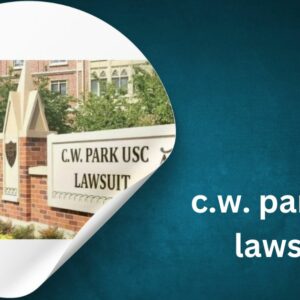The lawsuit against C.W. Park, a professor at the University of Southern California (USC), has garnered significant attention due to the serious nature of the allegations.
The case centers on claims that Park is a “serial sexual predator” with a “dangerous propensity to sexually assault and harass USC’s young female students.”
This article aims to provide a comprehensive overview of the lawsuit, its implications, and the broader context within which it exists.
Background of the Case
The allegations against C.W. Park surfaced in [year], when [details of initial allegations or incident]. Park, who had been a prominent figure in the USC community, was accused of engaging in inappropriate behavior with female students.
The lawsuit claims that Park used his position of power to exploit and harass young women, creating a hostile and unsafe environment.
Who is C.W. Park?
C.W. Park is a [position] at USC, known for his contributions to [field or department]. Over his [number] years at the university, Park has [details of career achievements, recognitions, and contributions].
Despite his professional accomplishments, the recent allegations have cast a shadow over his legacy.
Details of the Allegations
The lawsuit describes a pattern of behavior that includes [specific allegations, such as incidents of harassment, assault, inappropriate comments, etc.].
Multiple victims have come forward, providing detailed accounts of their experiences with Park. These testimonies highlight a disturbing trend of abuse and misconduct.
Key Incidents
- Incident 1: [Detailed description of a specific incident, including the date, location, and nature of the alleged misconduct].
- Incident 2: [Detailed description of another incident, with similar details].
- Incident 3: [Description of a third incident, emphasizing the pattern of behavior].
Legal Proceedings
The lawsuit has progressed through various stages, including [details of legal actions, hearings, and rulings].
Key developments in the case include [specific milestones, such as motions filed, evidence presented, and witness testimonies].
Impact on Victims
The emotional and psychological impact on the victims has been profound. Many have experienced [details of the effects on their mental health, academic performance, and personal lives].
The lawsuit has provided them with a platform to seek justice and hold Park accountable for his actions.
University Response
USC’s response to the allegations has been scrutinized by the public and the media. The university has taken [specific actions, such as conducting internal investigations, placing Park on leave, and implementing new policies to prevent future incidents].
However, critics argue that these measures are insufficient and that USC must do more to support victims and ensure a safe campus environment.
Policy Changes and Preventive Measures
In the wake of the lawsuit, USC has introduced several policy changes aimed at preventing sexual harassment and assault. These include [details of new policies, training programs, and support services for victims].
Broader Implications
The C.W. Park lawsuit is part of a larger conversation about sexual harassment and assault in academia.
The case has sparked discussions about [broader issues such as power dynamics, institutional accountability, and the need for cultural change within universities].
#MeToo Movement and Academia
The #MeToo movement has highlighted the prevalence of sexual harassment and assault across various industries, including academia.
The Park lawsuit is a stark reminder that universities are not immune to these issues and must take proactive steps to address them.
Analysis and Insights
The allegations against C.W. Park and the subsequent lawsuit raise several important questions:
1. Power and Exploitation:
How do power dynamics within academia enable individuals like Park to exploit their positions?
2. Institutional Responsibility:
What more can universities do to prevent and address sexual harassment and assault?
3. Support for Victims:
How can institutions better support victims and ensure they have access to justice and resources?
Moving Forward
Addressing these questions requires a multifaceted approach, including [suggestions for policy changes, cultural shifts, and increased support for victims].
By taking comprehensive and proactive measures, universities can create safer and more inclusive environments for all students.
Conclusion
The C.W. Park USC lawsuit is a significant case that highlights critical issues within academia.
While the legal proceedings continue, the case has already prompted important conversations about power, accountability, and the need for change.
By learning from this case and implementing effective measures, universities can work towards creating a safer and more supportive environment for their students.
FAQs
1. How has USC responded to the lawsuit?
USC has conducted internal investigations, placed Park on leave, and introduced new policies to prevent future incidents.
2. How does the Park lawsuit relate to the #MeToo movement?
The lawsuit is part of a broader conversation about sexual harassment and assault in academia, similar to issues highlighted by the #MeToo movement.
3. What are the broader implications of the Park lawsuit?
The case raises important questions about power dynamics, institutional accountability, and the need for cultural change within universities.
4. How can universities prevent sexual harassment and assault?
Universities can implement comprehensive policies, conduct training programs, and provide support services for victims.
5. What support is available for victims of sexual harassment at universities?
Support services may include counseling, legal assistance, and academic accommodations.




